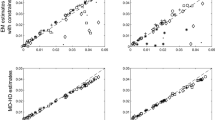Abstract
An extension of the theory of knowledge spaces by Doignon & Falmagne (1985) is presented that tries to account for subjects’ typical errors and wrong answers. This extension concerns two major points: The usual dichotomous item format (right/wrong) is generalized to polytomous response categories, and the theoretical structure (knowledge, skills, misconceptions) is clearly separated from the empirical structure (observable solution behavior, subject’s responses). Using examples from a set of questions about properties of simple electric circuits the general method is demonstrated. Axioms of an algebraic structure known as “information system” (Scott, 1982) are shown to provide an appropriate characterization of the theoretical domain. The structural properties of the data, on the other hand, can be derived from assumptions about the influence of knowledge and misconceptions on specific answers for a set of questions.
Zusammenfassung
Die Theorie der Wissensstrukturen nach Doignon & Falmagne (1985) wird so erweitert, daß sich damit auch typische Fehler von Probanden modellieren lassen. Die Erweiterung betrifft vor allem zwei Punkte: (a) die Verallgemeinerung der dichotomen Antwortkategorien (richtig/falsch) auf mehrere Antwortalternativen und (b) die explizite Trennung von theoretischer Struktur (Wissen, skills, Lösungsheuristiken, Fehlkonzepte etc.) und empirischer Struktur (Aufgabenbeantwortung, Lösungsvektoren, beobachtbares Antwortverhalten). Für die theoretische Struktur liefert die Axiomatik der sogenannten Informationssysteme (Scott, 1982) eine geeignete algebraische Charakterisierung. Die empirische Struktur läßt sich aus Annahmen über den Zusammenhang von Wissen und Antwortverhalten ableiten. Anhand von Aufgaben aus dem Wissensbereich „Elementarphysik einfacher elektrischer Stromkreise“ wird die Vorgehensweise exemplarisch dargestellt
Similar content being viewed by others
Literatur
Albert, D. (ed.) (1994) Knowledge Structures. New York: Springer
Bauman, R. P. & Adams, S. (1990) Misunderstandings of electric current. The Physics Teacher 28, 334
Chen, H. & Dhar, V. (1990) User misconceptions of information retrieval systems. International Journal of Man-Machine Studies 32, 673–692
Chomsky, N. (1965) Aspects of the theory of syntax. Cambridge, MA: MIT Press
Clement, J. (1983) A conceptual model discussed by Galileo and used intuitively by physics students. In: D. Genter & A.L. Stevens (eds.), Mental Models (pp. 325–340). London: Lawrence Erlbaum Associates
Davey, B. A. & Priestley, H. A. (1990) Introduction to lattices and order. Cambridge: Cambridge University Press
Doignon, J.-P. & Falmagne, J.-C. (1985) Spaces for the assessment of knowledge. International Journal of Man-Machine Studies 23, 175–196
Dowling, C. E. (1993) Applying the basis of knowledge spaces for controlling the questioning of an expert. Journal of Mathematical Psychology 37, 21–48
Dowling, C. E., Hockemeyer, C. & Ludwig, A. H. (1996) Adaptive assessment and training using the neighbourhood of knowledge states. In: C. Frasson, G. Gauthier & A. Lesgold (eds.), Intelligent Tutoring Systems (pp. 578–586) Berlin: Springer
Droste, M. & Göbel, R. (1990) Non-deterministic information systems and their domains. Theoretical Computer Science 75, 289–309
Duit, R., Jung, W. & Rhöneck, C. von (1985) Aspects of understanding electricity. Proceedings of an international workshop in Ludwigsburg, 1984. Kiel: Schmidt & Klaunig
Falmagne, J.-C. (1993) Stochastic learning paths in a knowledge structure. Journal of Mathematical Psychology 37, 489–512
Falmagne, J.-C., Koppen, M., Villano, M., Doignon, J.-P. & Johannesen, L. (1990) Introduction to knowledge spaces: how to build, test and search them. Psychological Review 97, 201–224
Gauld, C. F. (1988) The cognitive context of pupils’ alternative frameworks. International Journal of Science Education 10, 267–274
Gentner, D. & Gentner, D. R. (1983) Flowing waters or teeming crowds: Mental models of electricity. In: D. Gentner & A.L. Stevens (eds.), Mental Models (pp. 99–129) London: Lawrence Erlbaum Associates
Heines, J. M. & O’Shea, T. (1985) The design of a rule-based CAI tutorial. International Journal of Man-Machine Studies 23, 1–25
Held, T. (in Druck) An integrated approach for constructing, coding, and structuring a body of word problems. In: D. Albert & J. Lukas (eds.), Knowledge spaces: Theories, empirical research, applications. Hillsdale, NJ: Lawrence Erlbaum Associates
Koppen, M. & Doignon, J.-P. (1990) How to build a knowledge space by querying an expert. Journal of Mathematical Psychology 34, 311–331
Korossy, K. (1993) Modellierung von Wissen als Kompetenz und Performanz. Unveröffentlichte Dissertation, Universität Heidelberg
Korossy, K. (1996) Kompetenz und Performanz beim Lösen von Geometrieaufgaben. Zeitschrift für experimentelle Psychologie 43, 279–318
Lukas, J. & Albert, D. (1993) Knowledge assessment based on skill assignment and psychological task analysis. In: G. Strube & K. F. Wender (eds.), The cognitive psychology of knowledge (pp. 139–159) Amsterdam: Elsevier (North-Holland)
Maichle, U. (1985) Wissen, Verstehen und Problemlösen im Bereich der Physik. Frankfurt/Main: Peter Lang
McCloskey, M. (1983) Naive Theories of Motion. In: D. Gentner & A.L. Stevens (eds.), Mental Models (pp. 299–324) London: Lawrence Erlbaum Associates
Narciss, S. (in Druck) Application of Doignon and Falmagne’s theory of knowledge spaces to the assessment of motor learning processes. In: D. Albert & J. Lukas (eds.), Knowledge spaces: Theories, empirical research, applications. Hillsdale, NJ: Lawrence Erlbaum Associates
Nilson, N. J. (1971) Problem-solving methods in artificial intelligence. New York: Mc Graw-Hill
Novak, J. (ed.) (1987) Proceedings of the 2. International Seminar on Misconceptions and Educational Strategies in Science and Mathematics. (Vol. 1–3). Ithaca, NY: Cornell University
Pfundt, H. & Duit, R. (1991) Bibliographie Alltagsvorstellungen und naturwissenschaftlicher Unterricht (3. Auflage) Kiel: Institut für die Pädagogik der Naturwissenschaften
Schrepp, M. (1995) Modeling interindividual differences in solving letter series completion problems. Zeitschrift für Psychologie 203, 173–188
Scott, D. (1982) Domains for denotational semantics. In: M. Nielsen & E. M. Schmidt (eds.), Automata, Languages, and Programming (pp. 577–613) Heidelberg: Springer. (Lecture Notes in Computer Science, 140)
Sleeman, D. H. (1986) Inferring (mal)rules from pupil’s protocols. In: L. Steels & J. A. Campbell (eds.), Progress in artificial intelligence. Chichester, Sussex: Ellis Horwood
Stumme, G. (1996) Exploration tools in formal concept analysis. In: E. Diday, Y. Lechevallier & O. Opitz (eds.), Ordinal and symbolic data analysis (pp. 31–44) Berlin: Springer
VanLehn, K. (1990) Mind bugs: The origins of procedural misconceptions. Cambridge, MA: MIT Press
Author information
Authors and Affiliations
Corresponding author
Rights and permissions
About this article
Cite this article
Lukas, J. Modellierung von Fehlkonzepten in einer algebraischen Wissensstruktur. Kognit. Wiss. 6, 196–204 (1997). https://doi.org/10.1007/BF03354921
Published:
Issue Date:
DOI: https://doi.org/10.1007/BF03354921




